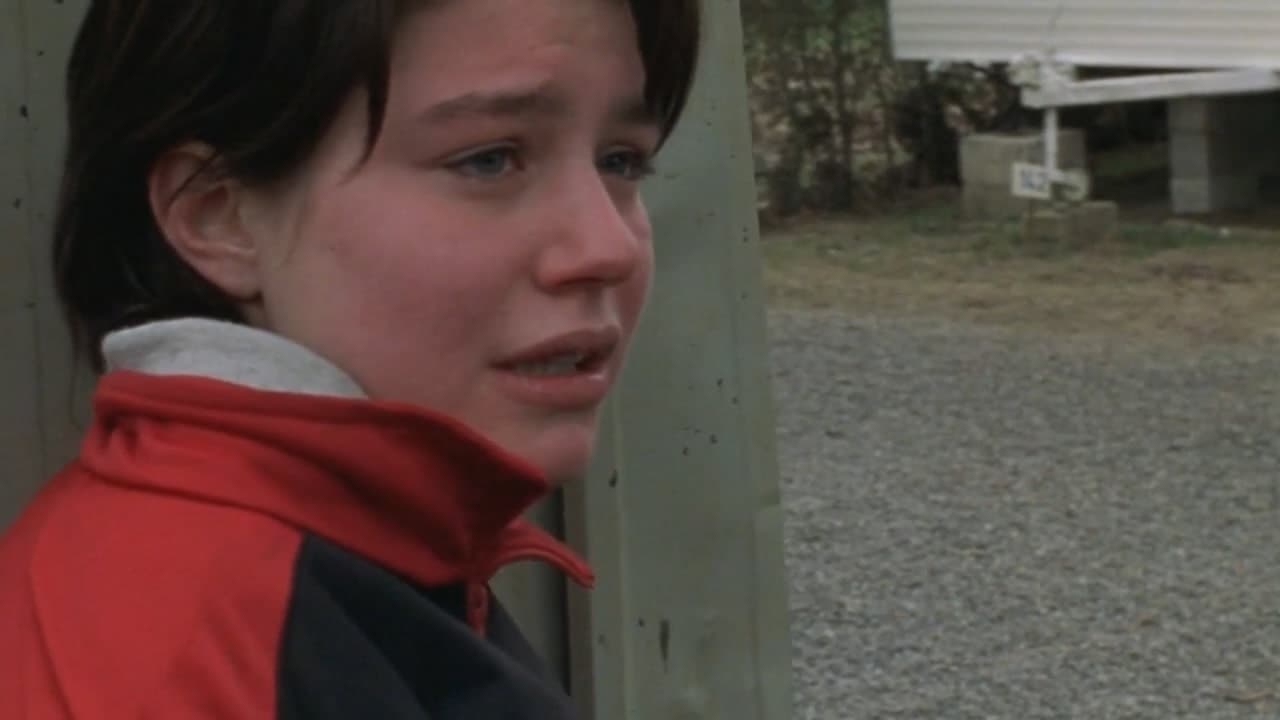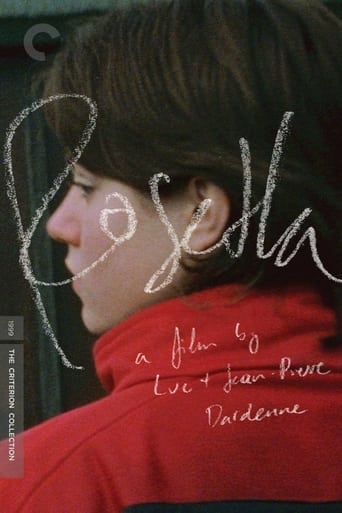

The film creates a perfect balance between action and depth of basic needs, in the midst of an infertile atmosphere.
... View MoreA movie that not only functions as a solid scarefest but a razor-sharp satire.
... View MoreThe best films of this genre always show a path and provide a takeaway for being a better person.
... View MoreClose shines in drama with strong language, adult themes.
... View MoreAs usual with the Dardenne brothers, there's no time for fancy film-making or cinematic conventions. "Rosetta" opens with the titular 'heroine' walking in her white uniform in some unidentified workplace while the camera follows her, chases her would be most appropriate term as it seems struggling to keep her on frame, while we can hear the loudness of her firm steps indicating that she's either angry or determined. She's both actually. She's angry to learn that she won't be working anymore, her probationary delay had just ended, angry because she thinks she's been denounced for coming too late by a co-worker (whom she confronts) and determined to keep her job and not let anyone throwing her away. She locks herself in a room but it's only a matter of time before security agents get her out. This is the beginning of "Rosetta", Golden Palm winner of 1999, a unanimous vote, and from the way the first scene plays, we suspect that this ending is only a new beginning. The Dardennes brothers style of filmmaking is integral to the power of "Rosetta", it can look like pretentious art-house take-the-camera-and-shoot cinema verité but the content is so genuinely powerful that you can't accuse the form. "Rosetta" always walks one step ahead of the camera, we often see her from behind going from one direction to another, this is a young girl struck by poverty and unemployment, living in a trailer park and witnessing the downfall of her mother, prostituting herself for booze. She seems to go in many directions because she can't afford standing still and a job isn't a matter of life and death, but of self-esteem, her mother surrendered, she wouldn't. But then I make the film sound like delivering an uplifting message about courage and determination, and it would be too misleading. The Dardennes are too aware of the harsh reality of unemployment and poverty to make anything remotely happy emerge from it, perhaps the greatest tragedy of being poor is that it leads to a point where you can't afford even happiness. And Rosetta, played by Emilie Dequenne (she won the Cannes Prize for her performance) rarely smiles, she's suspicious, tacit except when it comes to ask for a job, she's got the will, the determination but Dardennes' movies aren't filmed like melodramas but documentaries, which doesn't diminish their power in terms of pure storytelling. The film takes off when she finds a job in little Belgian waffle stand, her boss (Olivier Gourmet) warns her about the precariousness of the job, but she learns well and fast. There she meets Riquet (Fabrizio Ringone) who seems genuinely interested in her. Still, if I didn't expect a romance, I didn't expect what would result from their encounter... and what happened was the perfect illustration of the inner ugliness of despair, when you've got nothing to lose and you can drive yourself to any corner. "Rosetta" is a melodrama in the sense that she can't be in love with something, except with the idea of having a job, a steady job and a normal life. Before sleeping, she recites herself that she finally found a job, this is interesting because we suspect she would never go as far as trading her body, or becoming a criminal. Even the perspective of working illegally doesn't rejoice her, what she wants is to feel normal, like everybody, to be happy, but can she? The extreme where she's driven is perhaps more disturbing than any of these scenarios because it consists of betraying. That's the power of poverty, it can make people act like heroes, victims and sometimes villains. The Dardennes who paint with the brush of truth the uncompromising portrayal of poor people, make us question our own perceptions.. This is not about sentimentalism, this is not about left-wing pathos, Rosetta is pathetic to some aspects, but there's no effort to make her sympathetic, she's just incapable to be happy or give a proper meaning to her life because she's been alienated already, it became symptomatic of her life. The film closes at the moment where we reached that realization and maybe it stops abruptly because it can either take a good or a bad path, but the point is made in this harrowing journey in Belgium, resurrecting the Italian neo-realism. There's something bad Rosetta does in the film but it's as bad what the protagonist does at the end of "Bicycle Thief", we condone it but we understand it. And I guess the Dardennes don't make film to provide emotional moments but just keep us close enough so we can understand why some people look gloomy, unhappy, suspicious and why they deserve our understanding and ironically enough our distrust. It's sad and cruel, but that's how it is. And again, the directing is part of the film's greatness, it takes us to very uncomfortable and closeted places like the inside of a trailer, a small bathroom, a waffle stands, we all feel like intruders, put in a place that are no cinematically pleasing, but that's the point, the camera goes where Rosetta goes, to places cinema usually ignores. The Dardennes don't care for the 'look', even if the long take isn't perfect, this isn't Hollywood, within this imperfection, we can sense tension, reality, urgency, despair, struggle and we have a glimpse of these emotions through the documentary style. Conventional filmmaking couldn't have worked for such a story, it had to be as minimalist as if it was embracing the same problems than its character. That's typical of the Dardennes, just like in "The Promise", as if the way they told the story was as inspiring as the story itself or made the same point. Like Italian neo-Realism or like Hitchcock movies, the form sometimes defines the content.
... View MoreBelgian brothers Jean-Pierre and Luc Dardenne wrote and directed 'Rosetta', winner of the Palm d'Or at Cannes in 1999, a film about an adolescent girl who shares a trailer and her entire existence with an alcoholic mother. Its simple story is put together with an intimate, naturalistic style: Rosetta carries the burden of what little is left of her dysfunctional family and aspires to get a job, her own place, to live a normal life, to find freedom; one day, she meets a young man who is willing to help her... The film packs a powerful punch, thanks in great part to the excellent performance of Émilie Dequenne, who won the prize for Best Actress at Cannes that year. Her facial expressions, her posture, even the way she scurries around from place to place, like a raccoon or some other wild animal, all convey the pain, despair, anger and shame that are eating her. I hesitated to watch it at fist, because I didn't know if I was in the mood for something terribly heavy. If you happen to share the same dilemma, fear not: 'Rosetta' isn't nearly as harrowing or difficult as, say, Lars Von Trier's 'Breaking The Waves' (1996). It's emotionally demanding, but the economy of its narrative provides a certain lightness. There's a moment in which the main character falls into muddy waters and has a hard time getting out, and I worried for a second that the film might start going into some not-very-subtle symbolism, which I think would have detracted from its main strength – that is, its minimalism and focus on the girl's primitive state of mind, desires, rough gestures. But I don't really think it goes in that direction. Another nice thing about 'Rosetta' is that it clocks out at 95 minutes. It would be too much if it went on for 3 hours. The length is just right.If you've already watched and enjoyed this film, I recommend 'The Maid' (2009), by Chilean director Sebastián Silva, which is similar in tone and is also very good, one of my favorites.
... View MoreThe heroine of this admirable but depressing French import is a sullen and troubled (both for good reason) teenager living in trailer trash penury with her alcoholic mother, and stubbornly pursuing what she calls "a normal life": defined as a paying job and someone to call a friend. Dramatic slices of life don't often come more lifelike than this, and thankfully so. It's about as far from Hollywood glitz and glamour as a film can get without becoming a documentary, taking as its subject part of an underclass typically ignored both on and off screen.The transparency of the script suggests a largely improvised scenario (there isn't much in the way of dialogue at any rate), and the performances are as natural as breathing. But the lack of any cosmetic crutches (music cues, sympathetic characters, a tidy resolution) can make watching it an oppressive experience, and all the restless, hand-held cinema veritè camera-work is enough to give the viewer a headache. The film won a handful of awards at Cannes, no doubt because it offers such an obvious stylistic rejection of the ongoing West Coast colonization of Europe, but there isn't anything here for audiences looking for entertainment.
... View MoreLike in Dardenne brothers films, in this one we witness how the main character makes a mistake because of hardships of life or because he/she is naive, then realizes the mistake and corrects it, eventually doing the right thing. No frills, no drama, yet so moving. When we watch this whole process with the kind of fantastic and unconventional closeness - the engrossing & realistic Dardenne-style of close up shots - we actually fall in love and sympathize with the main character - the girl Rosetta. This isn't a sad movie at all (like some people have commented), its a lovely movie that celebrates the spirit of being a normal human being, a must see for any cinema buff. Unlike ambiguous Hollywood films, Dardenne movies are simple and focused, the audience precisely and naturally sees what the directors want to say.
... View More